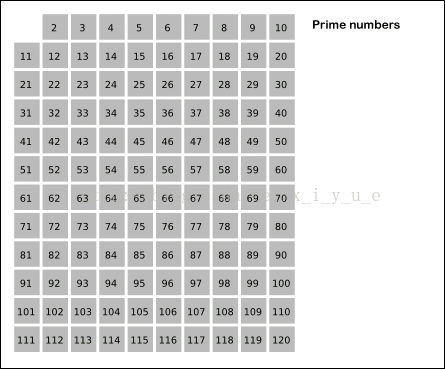A: Sieve of Eratosthenes (Sieve of Eratosthenes)
1. The basic idea of the algorithm:
If a number is prime , then its multiples certainly non-quality , linear table using the pre-defined way to play table quality non-marking, the remaining number is prime.
2. The selection process:
//#include <bits/stdc++.h>
#include <cstdio>
#include <cstring>
#include <cmath>
#include <algorithm>
#include <iostream>
#include <algorithm>
#include <iostream>
#include <cstdio>
#include <string>
#include <cstring>
#include <stdio.h>
#include <queue>
#include <stack>;
#include <map>
#include <set>
#include <ctype.h>
#include <string.h>
#include <vector>
#define ME(x , y) memset(x , y , sizeof(x))
#define SF(n) scanf("%d" , &n)
#define rep(i , n) for(int i = 0 ; i < n ; i ++)
#define INF 0x3f3f3f3f
#define PI acos(-1)
the using namespace STD;
{
typedef Long Long LL;
const int MOD = 1E9 +. 7;
const int N = 100009;
int VIS [N];
int A [N]; // prime number table
int main ()
{
VIS [. 1] = 0;
for (int i = 2; i <= N ; i ++) // marked as prime
VIS [I] =. 1;
int m = Floor (sqrt (N) +0.5);
for (int I = 2; I <= m; I ++ )
{
IF (VIS [I])
{
for (int J = I * I; J <= N; J + = I)
{
VIS [J] = 0; // use prime number multiples is composite filter
}
}
}
L = 0 int;
for (int I =. 1; I <= N; I ++)
IF (VIS [I])
{
a[l++] = i ;
cout << i << endl ;
}
}
return 0;
}
Summary: Eratosthenes screening method, while high efficiency, but Eratosthenes screening done a lot of wasted effort, a number will be screened to several times, the last time complexity is O (nloglogn), for the average prime algorithm in terms of already very efficient, but Euler screening time complexity is only O (n).
II: Euler screening
1. The basic idea of the algorithm:
prime prime array is incremented when i divisible prime [j], then i * prime [j + 1] This composite number must have been prime [j] multiplied by some number screened out.
Because i contains prime [j], prime [j ] [j + 1] is smaller than the prime. The next prime empathy. So I do not go on the screen.
I% prme satisfied before [j] == 0, and this condition is satisfied when the first condition changes, prime [j] must be prime [j] * i minimum quality factor.
//#include <bits/stdc++.h>
#include <cstdio>
#include <cstring>
#include <cmath>
#include <algorithm>
#include <iostream>
#include <algorithm>
#include <iostream>
#include <cstdio>
#include <string>
#include <cstring>
#include <stdio.h>
#include <queue>
#include <stack>;
#include <map>
#include <set>
#include <ctype.h>
#include <string.h>
#include <vector>
#define ME(x , y) memset(x , y , sizeof(x))
#define SF(n) scanf("%d" , &n)
#define rep(i , n) for(int i = 0 ; i < n ; i ++)
#define INF 0x3f3f3f3f
#define PI acos(-1)
the using namespace STD;
for (int I = 0; I <L; I ++)
typedef Long Long LL;
const int MOD = 1E9 +. 7;
const int N = 100009;
int VIS [N];
int A [N]; // prime number table
int main ()
{
VIS [. 1] = 0;
for (int i = 2; i <= N ; i ++) // marked as prime
VIS [I] =. 1;
int L = 0;
for (int I = 2; I <= N; I ++)
{
IF (VIS [I] )
{
A [L ++] = I;
}
for (int J = 0; J <L && I * A [J] <= N; J ++)
{
VIS [A [J] * I] = 0;
IF (I% a [j] == 0) break ; // every composite number will be to the minimum quality factor sieve
}
}
COUT << a [I] << endl;
return 0;
}
